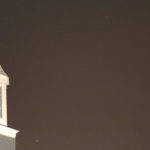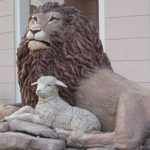WASHINGTON (ABP) — Nov. 5, 2008 was the most improbable day of my 34-year-old life.
The unlikely elevation of an African American to the presidency is just the latest episode in what the president-elect himself has called "the unlikely story that is America." And Christians of all ideological and political stripes should be able to cheer some aspects of what happened yesterday. I certainly can.
I am a Caucasian-American son of the South, raised in the first generation born after school integration. I graduated from a high school that is a landmark of the Civil Rights Movement. Ancestors on both sides of my family fought for the Confederacy.
And I experienced an American reality yesterday that would have been but a fantasy to a significant portion of our population for the first 500 years of America's life.
It began yesterday morning, on my way to work, when I went to vote. I reside in the District of Columbia and — as in many urban precincts around the country — the lines at my polling place were long. An African-American woman who looked to be in her 60s was in front of me, and she struck up a genial conversation.
She was raised in the South, she told me, and she remembered the days when her parents had to pay a poll tax to claim their right to vote. She was beaming at the chance to vote for a black man for president — an idea that would have been inconceivable to her ancestors.
Common roots
It turns out she and my father share the same hometown — Pine Bluff, Ark. When I told her about our common Arkansas roots, she embraced me.
After work, I joined about 20 friends — mainly fellow young adults from my church — for a voting-returns party in my neighborhood. When the networks announced that the senator from Illinois would be the next president, my friends, of every race, shed tears of joy.
Sign up for our weekly edition and get all our headlines in your inbox on Thursdays
And then our party and scores more like it spilled out into the streets of our Northwest Washington neighborhood. Everywhere I looked, there were merry bands of celebrants walking down sidewalks, shouting as fellow revelers passed by in cars and cabs, honking horns and blaring music.
The national news networks were showing footage of thousands of similarly jubilant Obama supporters who had gathered in front of the White House, about a mile south of where we were. Not wanting to walk that far in a chilly drizzle, we wandered down "U" Street, which was once the commercial and nightlife heart of Washington's African-American community — so much so that it was dubbed "Black Broadway."
At the corner of 14th and "U" a similar impromptu celebration had broken out. Thousands of people — mostly young, but with some older folks, and of every ethnicity under the sun — were dancing, singing, chanting. One guy even shimmied up the flagpole in front of the municipal building where I had voted earlier that day to shake the American flag with pride. The crowd cheered him wildly.
The police closed the intersection to vehicular traffic as the crowd swelled. Boisterous partiers set off fireworks. People grinned ear to ear.
Celebration went on
The celebration went well into the wee hours, even as media outlets finally declared that the Commonwealth of Virginia — the mother state of Robert E. Lee and Stonewall Jackson, the state whose law banning interracial marriage was not struck down by the U.S. Supreme Court until 1967 — would cast its electoral votes for the son of a black Kenyan immigrant and a white Kansan mother.
What many might not know is that the corner of 14th and "U" is the very place where, 40 years ago last April, the news of the assassination of Martin Luther King Jr. sparked the first of a massive wave of riots in black neighborhoods across the country. Washington burned for days, and "Black Broadway" was virtually destroyed. It didn't even begin to recover until young professionals — many of them white — began to gentrify the neighborhood in the late 1990s.
But last night another demonstration of a very different sort broke out at 14th and "U." Instead of people mourning the death of one dream for black America and destroying their own community in the process, a multi-hued array of humanity celebrated the birthing of a new dream — a dream in which they all have a legitimate stake.
Many white Baptists are wary of Obama because of his stances on some social issues. Others dislike his economic policies. But what any Christian who claims to believe in our Constitution should be able to thank God for is the sheer fact that a bi-racial man named Barack Hussein Obama has been elected to the highest office in a land where, scarcely 40 years ago, his parents wouldn't even have had the right to marry in many states.
And, as a result, millions of young Americans of every race and creed now feel that they are full participants in the political process.
Anyone who claims to follow the God who created all people in his own image should rejoice at that news. As the son of former slave owners, embraced by the daughter of former slaves, I certainly do.
— Robert Marus is ABP's acting managing editor and Washington bureau chief.













We seek to connect God’s story and God’s people around the world. To learn more about God’s story, click here.
Send comments and feedback to Eric Black, our editor. For comments to be published, please specify “letter to the editor.” Maximum length for publication is 300 words.